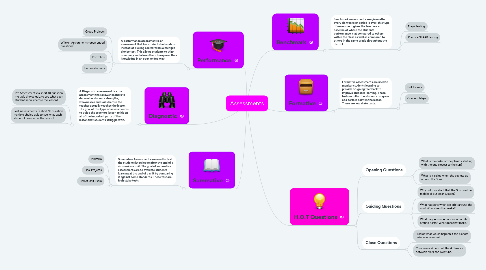
1. Performance
1.1. A performance assessment is an assessment that has students be hands on instead of picking a letter from a multiple choice test. This allows students to think creatively and allows them to express their knowledge in an open ended way.
1.1.1. Group Projects
1.1.2. Written Assignments (open ended questions)
1.1.3. Portfolios
1.1.4. Demonstrations
2. Diagnostic
2.1. A Diagnostic assessment is a pre assessment that allows teachers to determine students strengths, weaknesses and skills before the teacher actually teaches the lesson. The goal of this type of assessment is to guide the teachers lesson to hit on all of the important parts of the lesson that students struggle with.
2.1.1. Pre Assessments (a short 10 question multiple choice quiz to see what each student knows before the lesson)
2.1.2. Post Assessments (a short 10 question multiple choice quiz to see what each student knows after the lesson)
3. Summative
3.1. Summative Assessments are used to test the students knowledge after the end of a six weeks or unit. The goal of summative assessments are to evaluate students learning at the end of a unit by comparing it against some standards. These test are high stake tests.
3.1.1. Midterm
3.1.2. Final Projects
3.1.3. End of Unit Exam
4. Benchmark
4.1. Benchmark assessments are given after every six weeks or period is over, this type of assessment gives the teachers a baseline of where the students performance is at compared to others within the class as well as compared to others in the same grade throughout the district.
4.1.1. Maps Testing
4.1.2. Practice STAAR testing
5. Formative
5.1. Formative assessments are used to monitor students learning to provide on-going feedback to improve students learning. These tests monitor the students progress at a certain point in the lesson. These are low stake tests.
5.1.1. Exit Tickets
5.1.2. Concept Maps
6. H.O.T Questions
6.1. Opening Questions
6.1.1. What is the order of the planets starting with the one closest to the sun?
6.1.2. What is it called when the planets go around the Sun?
6.2. Guiding Questions
6.2.1. Why is it important that the Sun is in the middle of our solar system?
6.2.2. What happens when we orbit around the sun? What does that make?
6.2.3. What happens when our moon orbits around Earth? What does that make?
6.3. Close Questions
6.3.1. Predict what would happen if the planets order was reversed.
6.3.2. Compare and contrast the difference between Mars and Neptune.
